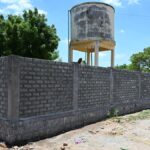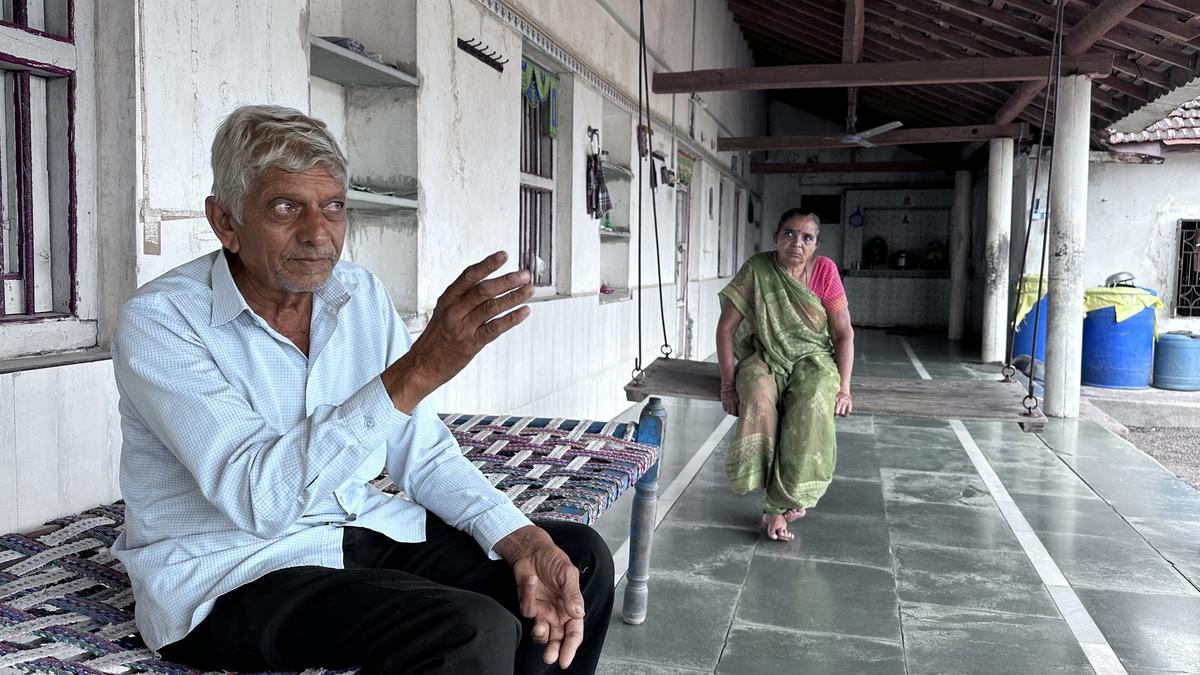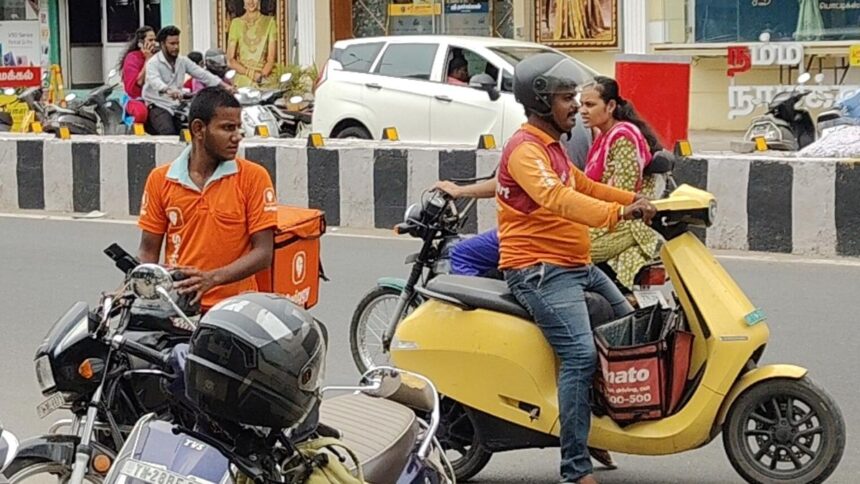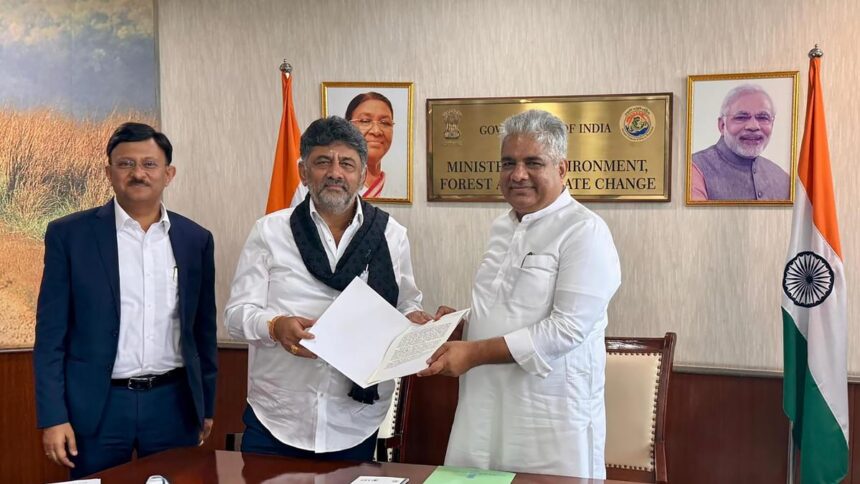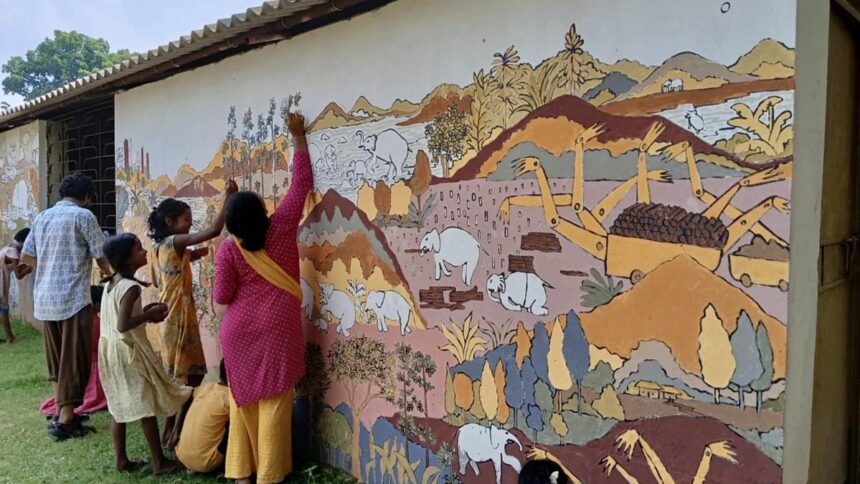It was a quiet morning — half sunny, half cloudy — in Lapaliya, a small village in Gujarat’s Amreli district. As Kannubhai Jadavbhai Lunagriya sinks into the familiar creak of his charpai (rope cot) on the veranda of his home, the woven bed groans under his weight. For the first time in years though, his mind feels light. There are no more threats. No more repeated knocks. No more fear of losing his of land, 30 bigha (approximately 12 acres) of which has fed his family for generations.
“At 70, I finally feel safe – not from illness or old age, but from the fear of losing the land. I lost it, but now it has been returned to me,” Kannubhai Jadavbhai Lunagriya, a resident of Lapaliya village in Gujarat’s Amreli district, while sitting on a charpai (rope cot) on a partly cloudy morning. Just a few steps away, his wife Champaben, 65, swaying back and forth on a wooden swing, nodded in agreement.
Mr. Lunagriya says the 30 bighas (approximately 12 acres) have fed his family for generations.
Over the past three years, the couple has allegedly been harassed by a man from whom their eldest son, Shailesh, took a loan. “Fearing for our lives, we left the village and went to live with our younger son Jignesh, who sells cutlery in Surat,” they say.
In June, Mr. Lunagriya approached Amreli district Superintendent of Police Sanjay Kharat and explained their ordeal. “Within three days of meeting SP saab, the long-pending issue was resolved. Babubhai Teriya came rushing to our home, said we don’t owe him anything, and even told us to forget about the ₹10 lakh he had wanted, in addition to our land,” Mr. Lunagriya says.
Between January and June 2025, the Gujarat police registered 315 cases against 756 moneylenders for operating illegally. The police have arrested 638 of them, as part of efforts to curb illegal money lending, according to data shared by Harsh Sanghavi, Minister of State for Home in Gujarat.
Amreli police alone have registered 11 cases and arrested 23 people in the first six months of 2025. According to Mr. Kharat, over the past couple of months, the police have helped five families in reclaiming their land or homes from loan sharks, with four more cases currently under investigation.
A price to pay
A narrow, dusty road leads to Mr. Lunagriya’s home, an ageing structure with more than six rooms in a row, a large open courtyard, and an empty cattle shed. The couple, suffering from age-related ailments and persistent knee pain, says they can no longer care for cattle, and even cleaning the house each day has become an exhausting chore.
The trouble with the land, says the Mr. Lunagriya couple, began with a ₹3 lakh loan that neither of them had taken. It was their son, Mr. Shailesh, who had quietly borrowed the money from Mr. Teriya, an apparent local moneylender in the village.
“We only came to know of the loan when Mr. Teriya showed up at home one day and said that our son owed him money. We needed to pay it, he told us,” says Mr. Lunagriya.
The interest rate for the borrowed amount was 10% per month, and it would be compounded if the Lunagriya couple failed to pay. “Mr. Teriya started threatening the couple and took possession of their land,” alleges Mr. Lunagriya.
Afraid and desperate, Mr. Lunagriya, in July 2023, took a crop loan of ₹17 lakh from a public sector bank. He says he paid ₹12 lakh to settle his son’s loan and used ₹5 lakh for agricultural purposes. Mr. Teriya, he claims, came back asking for another ₹10 lakh, as a “final settlement”.
When they couldn’t pay, he asked them to transfer their land to his name. “In August 2023, I signed a banakhat (sale agreement),” says Mr. Lunagriya. The couple further allege that last April, the borrower blocked off access to the farmland and roughed up Mr. Shailesh.
Amreli is one of the first districts in Gujarat where the police have started helping borrowers reclaim their properties from illegal moneylenders.
Amreli district SP agrees that the police are going beyond the call of duty. “Yes, we are stepping beyond our routine responsibilities to support those who’ve been pushed to the edge – financially and mentally – by loan sharks. Debt is a trap designed never to end. It’s not about recovery; it’s about complete takeover. First the money, then the land, and finally, the will to live,” he said.
While there are no suicide numbers that can be ascribed to debt in Gujarat, Mr. Kharat says, “In one such case, a man had borrowed money to pay for his mother’s cancer treatment. She died during the treatment. Overwhelmed by the burden of repayment, he died by suicide. The lender then seized their land, leaving behind only the elderly father, who had nothing left.”
The SP says the police intervened after the father reached out to them. “Once we resolved the matter, the father told us he didn’t want the land back – he was too old to farm, and there was no one left in his family. He only wanted the debt cleared and peace of mind. The financier agreed to pay ₹26 lakh to the man. It breaks a person from the inside out,” says Mr. Kharat.
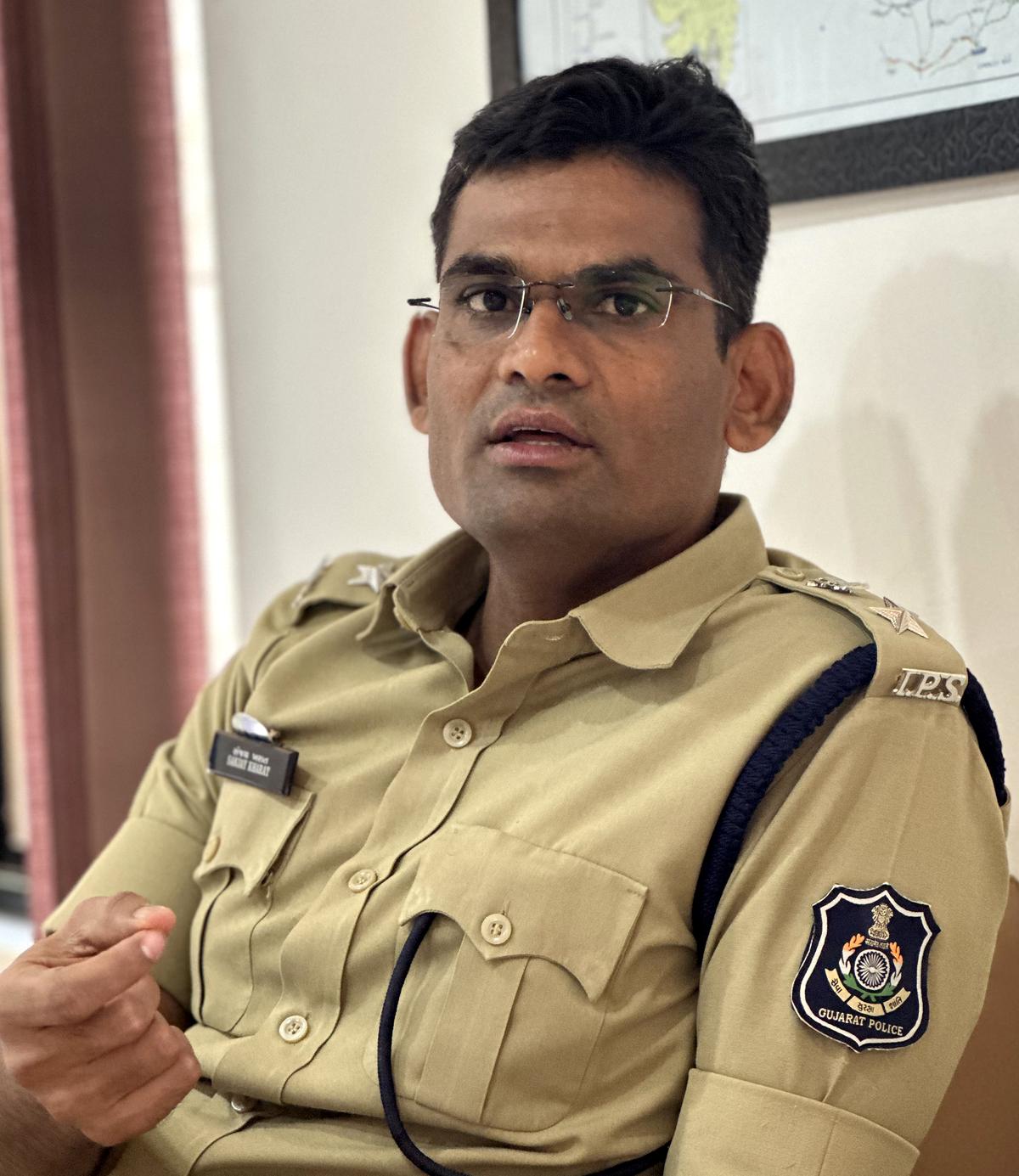
Amreli District Superintendent of Police Sanjay Kharat.
| Photo Credit:
Abhinay Deshpande
Courts often come down heavily on the police when they intervene in civil disputes – especially in land or property matters – while arresting and producing the accused in court.
Mr. Kharat says the police ask the victims to bring solid evidence such as legal documents, notarised agreements, even call recordings, all showing how their land was taken through crushing compounding interest.
“It helps us maintain a clear position that this is not just a civil dispute, but a criminal offence,” he says.
First information reports are filed under Section 308 (extortion) of the Bharatiya Nyaya Sanhita. Sections of the Gujarat Money Lenders Act, 2011, are also invoked.
Kept out of their mango orchard
A one-and-a-half-hour drive from Amreli leads to Rameshbhai Solanki’s mango orchard in Zar village, near Dhari, in Amreli district, where over 400 Kesar mango trees are spread across more than 8 acres of land. With the mango season ending a few weeks ago and the trees now bare, Rameshbhai says this was the first time in four years he was able to sell the harvest from his orchard.
His family had been barred from entering the premises after a local doctor, Mithil Faldu from Dhari town, had lent Ramesh’s brother, Jaysukh, ₹50 lakh in 2020. He had allegedly hired goons to block their access. The brothers allege that Faldu seized control of the orchard and harvested and sold the mangoes without sharing any profits with the Solanki family. He has been booked by the police for illegal money lending after the family filed an FIR in March 2025.
“I took the loan to cover the losses from my onion crop on 37 acres, which was destroyed by a cyclone,” says Jaysukh, glancing at his brother and his son, Rahul. “The agreement was to repay the principal in the third year, with 3% monthly interest. But just 30 days later, Faldu began pressuring me to repay the loan. He knew our financial condition at the time. That’s when he demanded we transfer our land to his name until the amount was repaid.” Their mango orchards, he says, yield produce worth ₹15 to ₹20 lakh each summer.
With the orchard out of their hands and other crops bringing in losses, the Solanki family was forced to shift to Ahmedabad. There, they earned between ₹2,000 and ₹3,000 a day by selling fruits and vegetables.
The family says they approached Faldu to settle the debt and reclaim the land in both 2023 and 2024. He demanded ₹1.20 crore. When the family agreed to pay the sum to regain possession, he refused. Standing in the middle of their lands, the brothers remember him saying, ‘I don’t want to sell my orchard.’ They add that the orchard is among the very few in the region that has a 250-foot-deep traditional well with water available in all seasons. “We were stunned by his response. Each bigha is worth at least ₹16 lakh, and with 18 bigha, that makes it roughly ₹2.88 crore,” Rameshbhai explains.
The Solanki brothers, too, approached Kharat, whose assistant SP Jayvir Gadhvi registered a case against Faldu at the Chalala police station. “Within 11 days, the matter was resolved. We only paid back the principal amount and got our land back. We never imagined this day would come,” the brothers say.
They regained possession in April 2025 and harvested the produce in summer. Rameshbhai shares that he pledged 50 grams of his wife’s gold ornaments to cover the education expenses of their four children. “Jaysukh had taken the loan, but even my share of the orchard was taken away. I suffered a loss of at least ₹8 lakh a year for four years,” he adds.
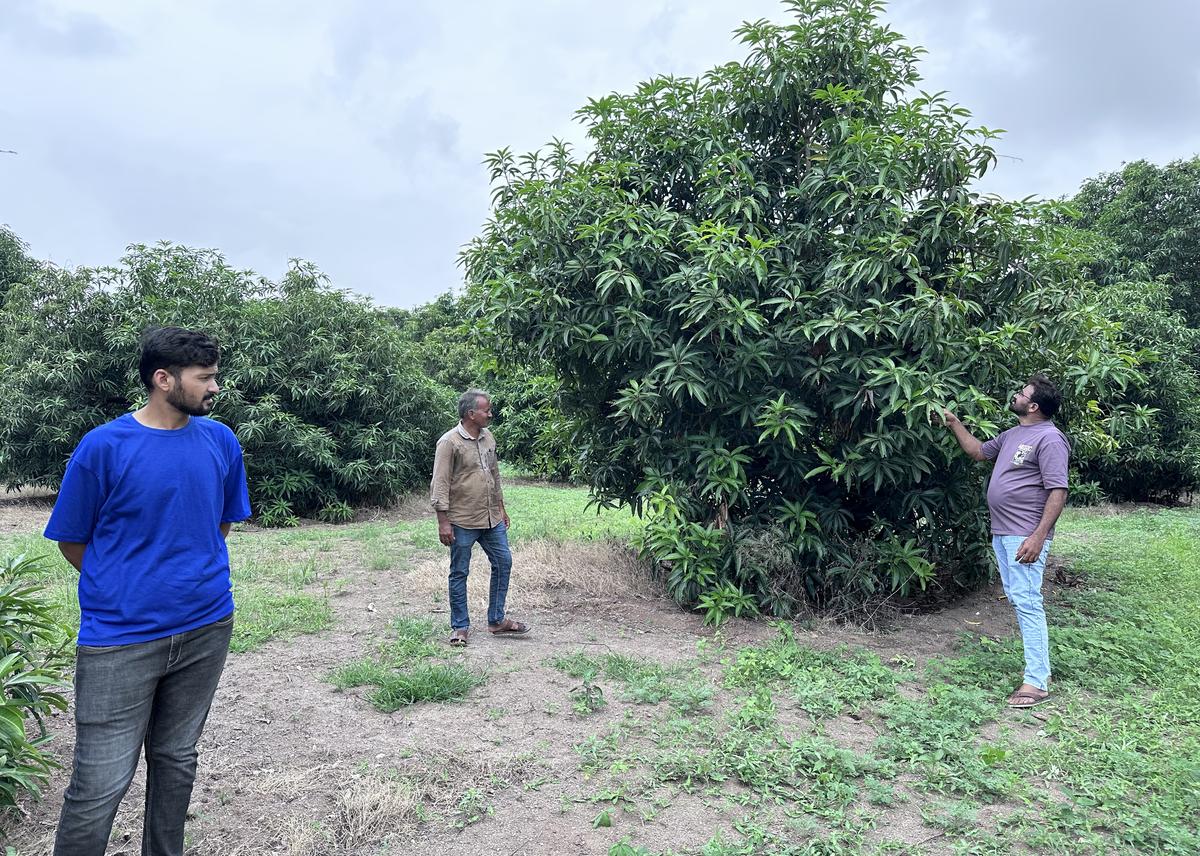
Rameshbhai Solanki, his brother Jaysukh Solanki and the latter’s son Rahul at their mango orchard in Zar near Dhari in Amreli district.
| Photo Credit:
Abhinay Deshpande
Going after loan sharks
Gujarat’s business-driven culture often leads people to seek loans from private money lenders to support their ventures. Many avoid banks due to the lack of property documentation, as land and assets are frequently registered in the name of a family head and are undivided within joint families.
“Many lenders turn into loan sharks, exploiting borrowers to the point of ruin. This is especially prevalent in rural and semi-urban areas,” a police officer says.“We register cases and try to explain the nature of the offence lenders have committed. Many lenders realise their mistake and return the property,” says Kharat.
Minister Sanghavi acknowledges the problem and calls illegal lenders “economic predators who exploit the poor, trap families in debt, and destroy futures”. He adds that the government is “taking historic actions by seizing properties, assets, and vehicles of organised loan rackets. FIRs have been registered, and offenders are being booked under the toughest legal provisions,” the MoS Home explains. He refers to the Gujarat Control of Terrorism and Organised Crime (GUJCTOC) Act, 2015, which is being invoked.
Sanghavi says no one who profits from people’s pain will be spared. According to him, 779 cases were registered last year against 1,814 money lenders, of whom 1,763 were arrested. He says it is not just a drive, “but a decisive battle against illegal moneylending and loan sharks who have devastated countless lives”.
Assistant SP Valay Vaidya (Dhari) says that while some victims have started coming forward, encouraged by these interventions, many others remain hesitant, fearing retaliation from powerful local moneylenders.
DGP Vikas Sahay says, “Over the past one and a half years, nearly 700 Loan Melas have been organised at local police stations in collaboration with government and cooperative banks. Through this initiative, we are ensuring that people have access to legitimate and safe financial support.” These efforts, combined with increased awareness of government schemes, have empowered lakhs of citizens with dignified alternatives and lasting relief from the exploitative cycle of debt, he adds.
We only came to know of the loan when Babubhai showed up at home one day and said that our son owed him money. We needed to pay it, he told us.
deshpande.abhinay@thehindu.co.in
Edited by Sunalini Mathew




